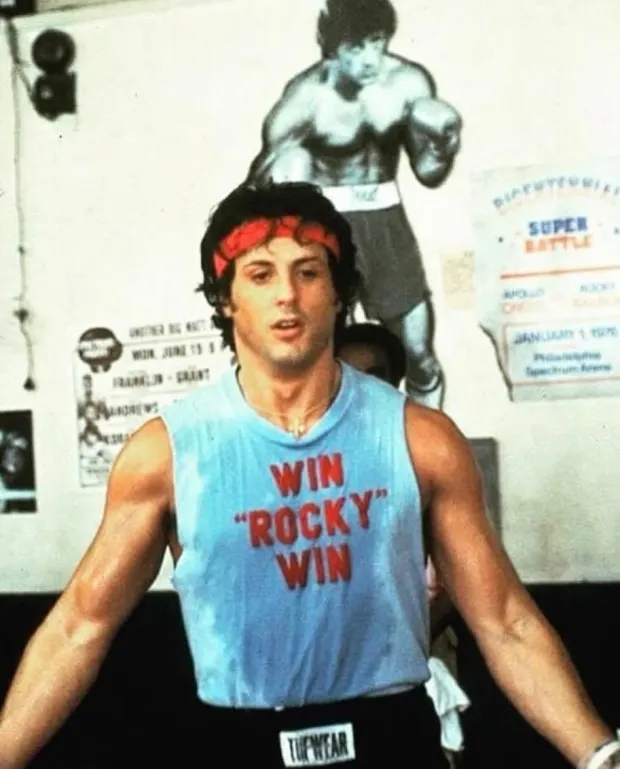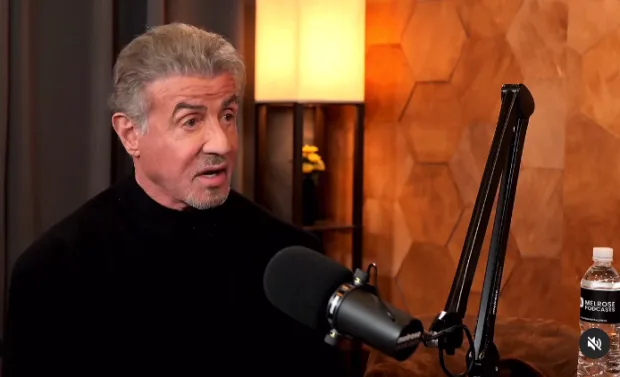Hollywood icon Sylvester Stallone may be best known for playing fearless, larger-than-life heroes — but behind the scenes, his real-life story is one of heartbreak and resilience.
Now 78, the legendary actor recently opened up in a rare, emotional interview on the Unwaxed Podcast, hosted by his daughters Sophia and Sistine.
During the candid conversation, Stallone revealed a deeply personal truth: one of Rocky II’s most intense moments — the explosive argument between Rocky and his trainer Mickey — was actually inspired by his own unresolved pain and anger toward his father.
The tough exterior, it turns out, was forged by years of emotional struggle that began in childhood.

“I was terrified of him,” Stallone admitted. “As a kid, I didn’t have the courage — or even the words — to stand up to my father.”
In a rare and revealing moment on the Unwaxed Podcast, the Hollywood legend explained how years of buried pain found their way into one of the most powerful scenes in Rocky II.
The unforgettable moment shows Rocky erupting at his trainer Mickey, shouting, “I got pain, I got experience too!” before breaking down and ultimately making peace. For audiences, it was gripping cinema — but for Stallone, it was something far deeper.
“That wasn’t just acting,” he said. “That was me finally getting to say everything I held inside for so long. Writing that scene was like therapy.”
For Stallone, art became the outlet for a voice that had been silenced in childhood — and that scene wasn’t just a script. It was a long-overdue reckoning.

Sylvester Stallone — the man who brought Rocky Balboa and John Rambo to life — didn’t grow up feeling like a hero. Far from it.
In a heartbreaking recollection, the Hollywood legend described his childhood as anything but stable. He revealed that he spent the first four-and-a-half years of his life in a boarding house, placed there by parents who made no secret of their indifference.
“My parents weren’t fit to raise a goldfish, let alone children,” Stallone said with brutal honesty. “My mother would say things like, ‘You’re only here because the hanger didn’t work.’ I used to laugh — I thought it was a joke. But deep down, I knew it wasn’t.”
Those early wounds left scars. Stallone withdrew into himself, finding comfort not in people, but in pages — diving into comic books and losing himself in the worlds of Batman, Superman, and other fantasy heroes who, unlike him, always seemed to have a purpose.

“I escaped into fiction,” Stallone shared. “That was how I coped.”
As a child grappling with feelings of abandonment, he created his own world of heroes — even going so far as to craft homemade superhero costumes and wear them under his school clothes. “It was the only way I felt strong,” he said.
But what began as a survival mechanism would eventually become his superpower. Stallone didn’t just dream of heroes — he became one.
In 1976, Rocky hit theaters and changed everything. The underdog boxer from Philadelphia wasn’t just a character — he was Stallone’s soul on screen. Through writing, directing, and portraying Rocky Balboa, Stallone turned his personal pain into cinematic gold, creating a legacy built not just on muscle, but on heart, grit, and unshakable resilience.
Rocky wasn’t just a movie. For Stallone, it was a message: no matter where you come from or how broken you feel, the fight isn’t over — and you can rise.

Looking ahead, Stallone shows no signs of slowing down. The screen legend is gearing up for his next big role in Armoured, an upcoming action-thriller directed by Justin Routt, where he’ll star alongside Jason Patric and Josh Wiggins.
Even after decades in Hollywood, Stallone continues to evolve — not just as an actor, but as a storyteller unafraid to peel back the layers. Today, his greatest strength isn’t just in throwing punches on screen, but in sharing the wounds that shaped him.
In embracing his past, Stallone reminds us all: true strength isn’t about being unbreakable — it’s about rising, time and time again, no matter how many times life knocks you down.